#lee chung-yoon
Explore tagged Tumblr posts
Text
DRAGON FIVE: Lee Chung-Yoon (+ Lee Jin-Sung)

CHUNG-YOON <333333
...He matters a lot to me ok. I actually discovered him thanks to the Random Page button on the wiki (I needed to make some Sims back in 2020), so my attachtment to him is slightly longer than the overall bench. Though it is interesting that as I was actually writing a setting for him, a japanese fan made me realize something about this player that, well... Changed my whole view about him, for better or worse.
However, there's a little catch, and there's an extra character here, Fire Dragon's Coach Lee Jin-Sung. I already spoiled the reason why, but I'm going to develop on it further here.
Enjoy!
Both Chung-Yoon's parents work at the same hospital. His father is a nurse, and his mother a doctor. He mostly has to rely on his grandparents for care at the moment.
Like his profile says, he's very praised for his well care of the elders, including those of his own family. In fact, we could also say she's the actual caretaker of his grandparents instead. Some appreciate the detail and patience he has with old people, and his father often wonders if he could work as a nurse in the future. However... Let's say that's only one side of the coin.
...CY lives a double life, pretty much. While at home he's gentle and silent, at school he's a literal beast. Not only he's cold and asocial, but he's also extremely aggresive, often getting in trouble with the local bullies and delincuents of the class. All hidden from the adults and teachers of course; there are many, many street fights that Chung-Yoon participated AND won.
...It is actually unknown if CY does actually like this brute lifestyle or not. But it seems he at least tries very hard to cover it up from his parents -and specially his elders-.
...My reasoning to this whole HC comes from his actual hissatsu lineup, in which Breakthrough 2 is included. He's the only FD member to have it, you're welcome.
youtube
The only one who knows about his secret life however is Lee Jin-Sung, the FD coach. In my setting, he is the step-brother of Chung-Yoon's dad, as their parents married when they were young. So he's technically his uncle, even if they don't look that similar.
When CY was called to the selection, some controversy sparked upon making the connection; even making people accuse Jin-sung of nepotism. Since he doesn't seem to have any children able to play, why not use his brother's one instead?
This does cause Chung-Yoon to be seen down by other korean players and the media, often disregarding his actual soccer skills. And hell, even CY himself starts to have his own worries over why was he the one choosen for FD. But no matter what how many times the confronts the coach, he always gets the same answer from Jin-Sung: "There's a hidden potential in you, but you have to realize it".
Similarly to Ji-Nan, Chung-Yoon also uses football to express his anger away, unfortunately with a very aggresive playstyle involving way too many tackles to the opponent. And maybe few red cards. Maybe as the tournament progresses he'll eventually to find other ways to play without causing unnecessary harm.
At least, not everything with Chung-Yoon is always pain or harm. When practice is over he likes to spend his time window shopping, specially around those streets that sell unique things. Most of the time he'll do it alone, but in rare occassions he'll get to do it with one of his teammates.
Regarding them... Let's just say that CY isn't an unknown name at all, specially for the FD players that live in his same city; so -almost- everyone is aware of what Chung-Yoon can do if he gets angry. Because of that, nobody ever tries to take that risk.
I think the only time it went south with him was with Nagumo Haruya, I wouldn't be surprised if his atitude got onto CY's nerves. If it wasn't for both Aphrodi and Chang-Soo, chances were that Nagu wouldn't have survived until the Inazuma Japan match.
As for the bench, I think he gets so and so with them. Not bad, but its true that deep down Ji-Nan and the others are terrified of him, so they always have to watch their step whenever Chung-Yoon is nearby. Well, maybe not Hyeon-Dae. He treats him like he'd treat everyone, be it for ignorance or by innocence. At least CY takes it well, it seems...
One last player that treats him surprisingly nice too is Cho Myong-Ho. Yes, CY is intimidating, but look at those kicks! There's a formidable taekwondo rival hidden within! During the whole FFI he begged CY again and again to at least have a versus together, though it was never accepted from the bencher. Maybe it is for the best.
And with that, all the benchers who were clearly vissible on the anime have been covered :D
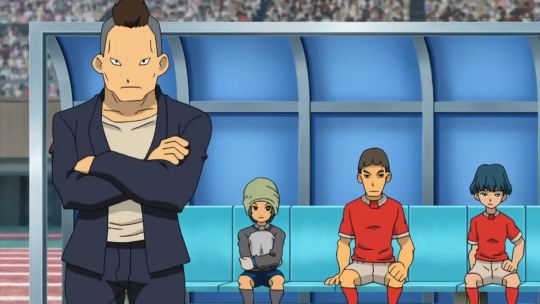
2 more to go!
#hc:ina11#fire dragon (ina11)#lee chung-yoon#lee jin-sung#Regarding the linked video: R.I.P Reef Hamilton#Your sacrifice was sad yet neccesary as to showcase Breakthrough 2#(Jokes aside. jfc......)#(I feel horrible for whoever Uzbek or Saudi Arabian player that had a VS aganist Chung-Yoon in the field)
3 notes
·
View notes
Text
Some background on South Korean politics in light of the 12.3 self-coup attempt
At 10:23 PM on 12.3, President Yoon Suk-yeol (Yun Seokyeol) declared martial law. The Korean people and MPs immediately mobilized to stop it. Although a group of special forces stormed the Parliament building and tried to break up legislative activity, 190 MPs made it into the chamber and voted only two hours later to rescind martial law. Soon after that, Yoon agreed to end martial law and the military officially stood down.

This was a bizarre and shocking few hours for everyone in the country and the world, and how Yoon got to the point of making this absurd decision is an interesting story. To tell it, I'll try to explain 1) South Korea's history of military rule, 2) Yoon's prosecutorial and political career, 3) the main opposition Together Democratic Party, and 4) Yoon's presidency. And finally, 5) what the self-coup attempt means for South Korea and the world.
I'll try to be brief as I can, but I'm starting from the assumption that most people know very little about South Korean politics. So, it's a long post.
Military rule
After fascist Japan surrendered at the end of WW2, it handed over power in the occupied Korean peninsula to an indigenous government called the People's Republic of Korea. Unfortunately, the new government was brutally suppressed by the US military in the South and warped into unrecognizable form by the Soviet Union in the North. In the South, the Republic of Korea was established as a US-aligned anticommunist dictatorship. Everything in this summary is extremely simplified, but suffice it to say that the Republic of Korea, or South Korea, more or less remained an anticommunist military dictatorship until 1987.

(One of the less graphic pictures of the Bodo League massacre, where the South Korean police and military killed 200,000 civilians)
Military rule in South Korea was founded on protecting South Korean capitalists, many of which had accumulated their wealth under the Japanese occupation, from the dual threats of leftists in South Korea and North Korean attack. South Korea retained the vast majority of colonial police employed by the occupation government, whose main purpose had been to root out and destroy independence guerillas, and repurposed them to root out and destroy left-wing guerillas (many of which were the same people). This caused an extraordinary level of state violence in early South Korean history. The South Korean prosecution service was similarly used to find and imprison or kill the opposition. Due to their function as part of an authoritarian state, the prosecution service was given broad powers to both investigate and prosecute.
Especially after President Park Chung-hee (Bak Jeonghui) took power (by overthrowing another short-lived democratic government), the South Korean state's purpose became not only to protect capital, but also to direct its expansion. The South Korean state used its control over credit to make companies invest in sectors that it predicted would have great export potential. Once a company established itself in a sector, the state directed it to use the profit it got from exports to invest in another, more capital-intensive sector. Over decades, this strategy led to enormous economic growth for South Korea and a massive rise in living standards. It also caused a few companies in particular to become fantastically wealthy global megacorporations. These are the chaebols (jaebeol), which include Samsung, Hyundai, LG, and others.
By 1987, a series of massive democratic protests and uprisings finally ended the dictatorship. A free election was held, and a general named Noh Tae-woo (No Taeu) was elected president. In the new democratic era, the conservative movement was formed as an alliance of dictatorship figures like Noh, chaebols, small businesses, and white collar workers who wanted to continue the economic policies of the dictatorship. The democratization movement continued as various incarnations of the Democratic Party (South Korean political parties change names and split and merge constantly), made up of unions, civil society activists, and students. Leftists have continued to be a minor force in South Korean politics, but for the purposes of this post I'll mostly set them aside. The main groups we're concerned with are conservatives and democrats, organized into a constantly shifting mush of political parties.
Supreme Prosecutor of the Republic
Before he became president, Yoon Seok-yeol was the Supreme Prosecutor of the prosecution service. To understand the significance of this, we have to take a look at the prosecution service in the democratic era and the political environment that Yoon emerged into.
During the dictatorship, everyone hated the police. So after the dictatorship, South Korea thoroughly reformed and defanged the police. This was a genuine success of the democratization movement. The police were turned from a gang of brutal thugs into an organization that almost never uses guns and is known for getting yelled at and beaten up by random citizens. If you hit a South Korean cop, the cop might be punished for annoying you. (Though the situation is different for ethnic minorities and striking workers.)
On the other hand, the prosecution service was left mostly untouched. While it obviously was no longer used for open political repression, it largely retained its broad investigative powers and personnel.
To put it simply, the prosecution service is an authoritarian holdover inside a democracy. It justifies its powers by being a hammer against the most powerful members of society. In South Korea, it's common for politicians of all parties to have their houses raided or be put in prison. This happens regularly even to former presidents, and even to some of the wealthiest people in the world, the heads of the chaebols. These things are unthinkable in most Western democracies. Whether you think these powers are justified or not, they've led to the prosecution service having far more active influence over politics than prosecutors in most democracies. As far as the prosecutors were concerned, that made them the heroes of this story.
These things came to a head in 2016 with conservative President Park Geun-hye (Bak Geunhye). Due to a series of massive scandals, Park had become extremely unpopular, with her approval rating hovering at 30 percent. What put the nail in the coffin for Park was an investigation by a prosecutor named Yoon Seok-yeol. Yoon exposed bizarre corruption involving President Park, Samsung, and a cult that had been involved with her family since the presidency of her father, Park Chung-hee. This led to massive protests and Park Geun-hye's impeachment.
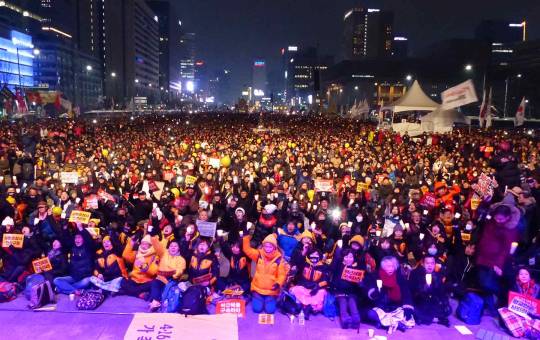
(2016 Candlelight Protests)
The president who succeeded Park, Moon Jae-in, promoted Yoon within the prosecution service. At his new position, Yoon prosecuted and imprisoned Park, as well as another conservative former president. At this point, he was becoming a major public figure, popular among democrats and hated among conservatives. So President Moon promoted Yoon again, this time to Supreme Prosecutor of the entire service.
And then, Yoon started investigating Moon's own justice minister. This led to a public dispute. Moon's government looked corrupt and hypocritical, and Yoon became more popular than ever. Soon, Yoon resigned his office and entered the conservative presidential primary.
Of course, conservatives welcomed Yoon's entry, and he won the primary and the presidency. But how did they go from hating him for destroying their president to fighting to get him elected? How did Yoon go from prosecuting a corrupt conservative to being one?
The reason for the switch from Park to Yoon lies in their political brands.
Park Geun-hye's brand was built on nostalgia for her authoritarian father. Many older South Koreans associate Park Chung-hee's regime with stability, rational economic management, and anticommunism. At the same time, even most conservative voters hate actual authoritarian behavior. All South Koreans have either lived under military dictatorship or have heard from their family what it was like, and almost nobody is eager to return. Once Park Geun-hye's corruption and inept attempts at election manipulation were revealed, she was finished.
This is why conservatives welcomed Yoon Suk-yeol into their party: they needed him to wash their hands of corruption. He was a rebirth of authoritarian discipline made acceptable by his prosecution of unpopular conservatives. His message was law and order: if we lock up the corrupt, criminals, and communists, the country can be saved from ruin. If we push workers harder (by increasing work hours), economic growth will continue. If we push women harder (by forcing a return to traditional gender roles), the birth rate will return to normal. And, of course, the chaebols should be deregulated and given tax cuts.
Together Democratic Party
Before we pick things back up with Yoon, his main opposition is worth a look. This is the Together Democratic Party, which along with other opposition parties blocked the declaration of martial law and is now pushing for Yoon's impeachment.
We can summarize the Democratic Party's traditional and typical outlook in the figure of President Moon Jae-in (Mun Jaein). This was Park Geun-hye's main rival and the president who promoted Yoon Seok-yeol. He can be considered something like the "Korean Barack Obama". He was liked by democrats and called a dangerous communist by conservatives, but he didn't do all that much in reality other than raising the minimum wage, reducing the workweek, and attempting diplomacy with North Korea. He is now generally liked because things felt normal, he handled the COVID-19 pandemic well, and he didn't make any earth-shattering mistakes. He's the only living president not to be imprisoned after leaving office.
For decades, the Democratic Party was this type of moderate reformist, center-right party. However, in just the past few years, the party has gone through a considerable transformation.
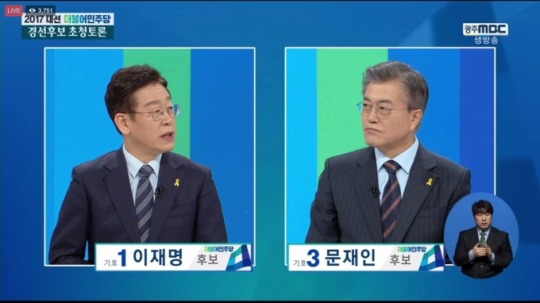
(A 2017 Democratic presidential primary debate, with Lee on the left and Moon on the right.)
The Democratic Party has now unquestionably become the party of a person named Lee Jae-myung (Yi Jaemyeong), who was elected party leader in 2022. He's been called the "Korean Bernie Sanders", and this label is at least somewhat accurate.
Like Bernie Sanders, Lee Jae-myung can be characterized as a radical social democrat. His policies could actually be characterized as more radical than Bernie Sanders'. As the governor of Gyeonggi Province, Lee introduced a youth basic income and experimented with universal basic income. As a national political figure, Lee pushes for what he calls his "Basic Society" policies. These include universal basic income, youth basic income, universal basic housing (by massively expanding public housing), expanding free healthcare coverage to nursing, free meals for seniors, and a four day workweek. In general, Lee criticizes means-tested welfare and advocates for universal programs that guarantee a baseline standard of living by right.
On the other hand, Lee could also be characterized as less radical than his policies would imply. A common criticism, which ironically comes from both conservatives and leftists, is that he doesn't often talk about how to pay for his policies. Conservatives see this as a sign of irresponsible populism and economic illiteracy, while leftists criticize him for not naming the enemy. Unlike Bernie Sanders, Lee doesn't rail against chaebols or inequality or push for taxes on the rich. He also tends to appeal to questionable technology like AI rather than collective action. So although Lee champions some genuinely radical policies, he certainly isn't a socialist.
Lee's public image is also quite different from someone like Bernie Sanders. Lee is generally seen as a figure of questionable morality due to a constant conveyor belt of personal scandals and corruption allegations. He has been accused of, among other things, abusing his staff, having his brother involuntarily committed, illegally sending money to North Korea using an underwear factory, and having connections to organized crime. Lee's personal legal controversies have been the greatest source of instability for him and the Democratic Party since he became its leader.
In fact, Lee was recently convicted of lying while campaigning in one of his trials in November. Due to now having a criminal conviction, he is technically barred from running for office again. However, the conviction could still be overturned on appeal and recent events have really thrown everything up in the air. And even if Lee himself can't run for office, his ideology has taken over the Democratic Party and it's likely that whoever succeeds him will share it.
So, Lee Jae-myung is the nemesis that Yoon Seok-yeol has been fighting for his whole presidency. A criminal versus a prosecutor. Universalism versus austerity. Relief versus discipline.
Yoon Suk-yeol's presidency
Finally, we return to President Yoon. Though even as a prosecutor he was a figure of questionable intelligence, as a politician he's revealed himself to be one of the most inept people in modern history.
Since the beginning of his term, Yoon has been unable to do nearly anything at all domestically. The Democratic Party already had a majority in Parliament at the beginning of his presidency, and so Yoon has been unable to enact literally any part of his legislative agenda. Instead, he was reduced to calling young people lazy, bemoaning the far too short workweek, and wishing he could cut welfare.
In April of 2024, parliamentary elections were held. Lee Jae-myung, Democratic party leader, used the primary process as an opportunity to purge the party of centrists. Despite the Democratic Party's parliamentary candidates being further left than they'd ever been, opposition parties expanded their hold over the Parliament and nearly won a supermajority. After their victory, Lee Jae-myung was reelected as party leader and Basic Society advocates were elected to every seat on the party's supreme council. The Democratic Party emerged more left-wing, more ideologically unified, and more powerful than it ever had been before.
Now that Lee's Basic Society ideology had consolidated its hold on the Democratic Party and the Parliament, the Parliament began trying to pass its agenda in earnest. The Parliament passed bills establishing an experimental UBI, preventing companies from suing workers for striking, and expanding labor protections to subcontractors, among others. Over and over, Yoon vetoed them. Yoon has vetoed 19 bills and pocket-vetoed 4 more, more than every other South Korean president combined.
Both Yoon and the Parliament accused each other of being obstructionists. The problem for Yoon was that the Parliament's policies were popular, while his policies were unpopular. As Yoon issued more and more vetoes, his approval rating only fell.

(A political cartoon by Bak Sunchan depicting Yoon as a lame duck saying "veto")
Without the ability to change domestic policy, Yoon put all of his energy into foreign policy. Due to their history and composition, conservatives want to maintain trading links with other developed countries and developing countries for the chaebols to export to, want to maintain anticommunist alliances with the US and Japan, and are hostile to North Korea. (Participation in this system is what led the South Korean military to commit atrocities in Vietnam.) Democrats are somewhat skeptical of both the US and Japan, and want reconciliation with North Korea. Yoon has been strengthening relations with the US and Japan, sending weapons to Ukraine, and taking a hard line against North Korea.
Although several of these efforts were unpopular, the most significant has probably been Yoon allowing Japan to list the Sado gold mine as a UNESCO World Heritage Site. Before Yoon, South Korea had been blocking this because the site failed to mention the thousands of Korean slaves forced to work in the mine during WW2.
So, the two years of Yoon's presidency had so far consisted of Yoon obstructing popular reforms while failing to pass unpopular reforms and engaging in unpopular war crime denialism. He was generally regarded as impotent, laughable, and annoying. And at the same time, allegations of Yoon's own corruption grew louder and louder.
Yoon's wife is accused of taking bribes and meddling in the conservative primary. Yoon's friend, a Marine Corps officer, is accused of negligence that resulted in a young conscript's death. Yoon is accused of using his friends in the prosecution service to interfere with both investigations. As these scandals grew, the Parliament passed bills appointing special prosecutors independent from the prosecution service to investigate them. Many of Yoon's vetoes were of these special prosecutor bills.
Since the parliamentary elections in April, Yoon has been stuck in a vicious cycle. The Parliament passes popular legislation and Yoon vetoes it. Yoon's approval rating falls. The Parliament passes a bill to investigate Yoon and Yoon vetoes it. More information and leaks about Yoon's corruption come out. Yoon's approval rating falls, eventually to 18 percent. Afraid of the public pressure, more conservative MPs distance themselves from Yoon.
It seemed inevitable that eventually, enough conservative MPs would defect to override Yoon's veto and appoint a special prosecutor. A special prosecutor would find evidence of Yoon's corruption. The public would grow only angrier with Yoon. The only road left would be impeachment and imprisonment, just like Park Geun-hye. Yoon bashed his head against the wall, unable to find a way out.
Clearly, somewhere in this pile was the final straw. On 12.3 at 10:23 PM, Yoon Seok-yeol turned on the camera and vomited blood.
So, what does the coup mean?
The declaration of martial law was so bewildering because it felt like it came out of nowhere. But that's not strictly true; the Democratic Party had been warning that Yoon was plotting to declare martial law for months. Most people dismissed this as a conspiracy theory, including myself. It was simply too far-fetched and illogical to contemplate, until it happened.
But the real reason it felt like it came out of nowhere was because, at the same time, it did. Not even Yoon's most devoted supporters were thinking about martial law. Apparently, everyone from the leader of Yoon's party to the Ministry of Defense to his own prime minister was caught totally by surprise. He circulated no conspiracy theories in advance, and not a single news network attempted to justify his actions. He had no cult of personality and no party ready to fall unquestioningly behind him. In short, he acted essentially alone. As soon as people rose up in defiance, he had no choice but to back down.
It's a good sign for South Korean democracy that the people defeated the self-coup attempt so quickly and decisively. But compare the political environment with that of other countries. How normal has authoritarianism become? How many people openly wish for a dictator? How subservient are the cabinet officials and the news networks? How cultlike are the major parties and how acquiescent is the opposition? These conditions make a country much more vulnerable to a ruler with authoritarian instincts. And we should expect authoritarians to act in creative and unprecedented ways.
The self-coup is an explosion of the authoritarian tendencies that have been bubbling under the surface of the conservative movement since the end of military rule. It's a decisive discrediting of Yoon's prosecutorial brand, which had been conservatism's last hope to maintain the people's trust. Yoon's impeachment and imprisonment are all but guaranteed. And the general consensus among both democrats and conservatives now is that Yoon's blunder has killed conservatism in South Korea for at least the next decade.
In fact, the 12.3 declaration of martial law might really have been a successful self-coup. In that the conservatives have removed themselves from power. And the death of the right is a golden opportunity that Korean leftists must seize. If Lee Jae-myung's Democratic Party becomes politically dominant, it must be challenged from the left to properly name the enemy. If the Basic Society policies become normalized, the left should treat them as common sense and demand more. When people become disenchanted with the democrats, the left must be ready as their competitor and obvious alternative, not the right.
Could South Korea see a new era of competition between a socialist left that wants to finally do away with the chaebols, a social democratic center that merely wants UBI, and a nonexistent right?
Maybe. Probably not. But a new world of possibilities has opened up.
#south korea#yoon suk-yeol#politics#news#12.3#martial law#lee jae-myung#park chung-hee#park geun-hye#korea#moon jae-in#democratic party#authoritarianism#coup#history
282 notes
·
View notes
Text
So I hc Tory as a great photographer, and that means:



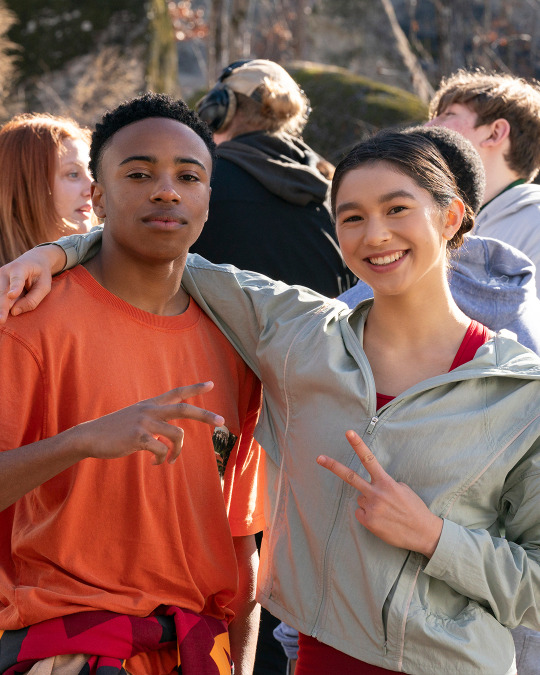
She took those pictures.
#tory nichols#kwon jae sung#yoon do jin#and probably min seok#john kreese#kim da eun#kenny payne#and stil NO DEVON TAG CAN WE CREATE ONE?#Tory loves taking pictures i said what I said#she's an ARTIST in this craft#heey edit here is not Min#it's chung hee#and also#devon lee ck#there's a devon tag :)
136 notes
·
View notes
Text
Recently started The Haunted Palace and so far, so good. As weird as it may sound, it's the perfect mixture of period drama, romcom and horror-fantasy. I love the two leads, too.
#the haunted palace#yook sungjae#bona#yook sung jae#wjsn bona#kim jiyeon#kim ji yeon#kim ji hoon#kim sang ho#kil hae yeon#shin seul ki#kim in kwon#cha chung hwa#han so eun#han soo yeon#lee won jong#kim sun bin#song su yi#yoon sung shik#yoon soo jung#kdrama#period drama#historical drama#romcom#horror#horror fantasy#ghosts#supernatural horror
24 notes
·
View notes
Text
Vines, but with Rotbb characters.
Credits: Me and the poster of the original base video.
#vines#return of the mount hua sect#return of the blossoming blade#rotbb#chung myung#rotmhs#Hong Daekwang#jang ilso#baek cheon#yoon jong#jo geol#tang soso#tang gunak#tang pae#tang zhan#cheon ma#Cho Sam#Gu Chil#Abott#Beop Gye#Seol Sobaek#Meng so#Im Sobyeong#Namgung Dowi#Namgung Myeong#lee songbaek#Jin Geomryong#cheong myeong#Cheong Mun#Cheong Jin
36 notes
·
View notes
Text




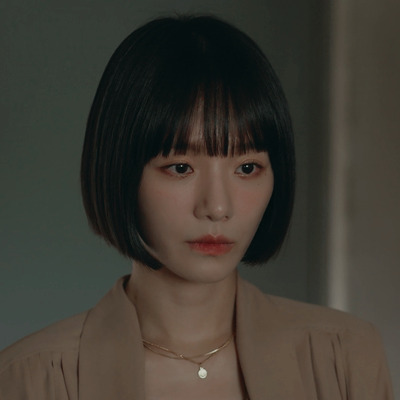
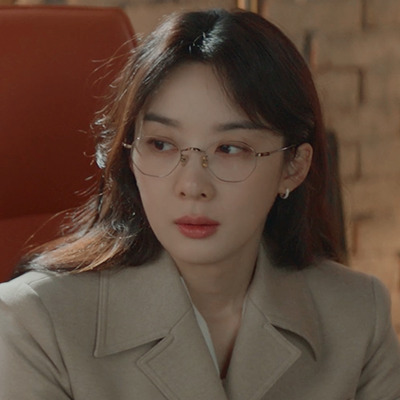


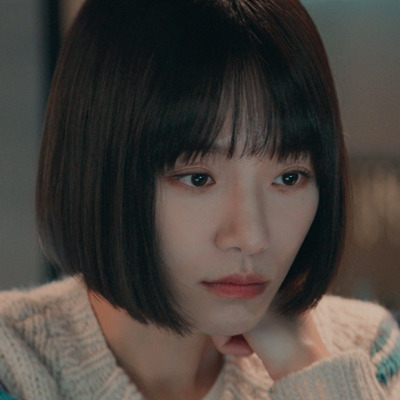
like or reblog if you save.
#celebrity#celebrity icons#celebrity kdrama#park gyu young#park gyu young icons#lee chung ah#lee chung ah icons#seo ari#yoon si hyeon#dorama icons#kdrama icons#kdramaedit
184 notes
·
View notes
Text


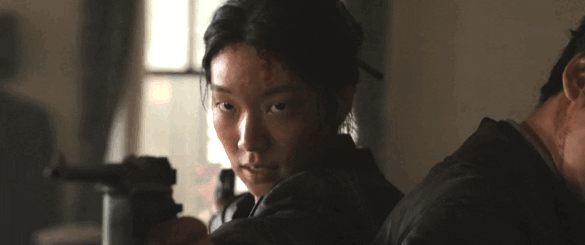
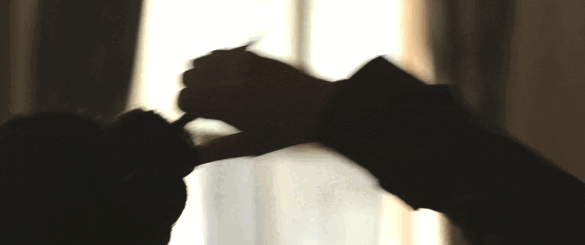
Song of the Bandits (2023) | Season 1, Episode 7 | Favorite moments




#Them working together and slaying people together ☠️👏🤍#eon-nyeon letting her hair down to stab some dudes was such an iconic move 🤍#the knife throw and little wave cracked me up for sure 🤣#also the parallels between their parents' fates... and how it was revealed/edited together 🫠😭#song of the bandits#lee ho jung#kim nam gil#cha chung hwa#eon-nyeon#lee yoon#kdramadaily#kdramas#kdrama gifs#mygifs#animated gifs#favorite characters#combat#action scenes#korean dramas#gif set#fight scene#song of the bandits netflix#netflix kdrama#currently watching#tv show gifs#tv shows#character dynamics
73 notes
·
View notes
Text

#Celebrity#셀러브리티#celebrity kdrama#kdrama celebrity#kdrama#Korean drama#Netflix#Netflix kdrama#Studio Dragon#Lee Chung-ah#Yoon Si-hyeon#Lee Chungah#Yoon Sihyeon#Lee Chung ah#Yoon Si hyeon#hug kiss marry kill
4 notes
·
View notes
Text
youtube
Seo A-Ri & Yoon Si-Hyeon || Be My Lover
📸💖📸💖📸💖
#celebrity#celebrity netflix#celebrity kdrama#park gyu young#lee chung ah#seo ari#yoon si hyeon#셀러브리티#kdramaedit#Youtube
25 notes
·
View notes
Text

Who: Lee Chung-Ah as Yoon Si-Hyeon
What: Leeho Praia Tweed Top and Pants - $555.00 / $495.00 Where: Celebrity (Netlfix) 1x02 “#following, follower"
#celebrity#celebrity netflix#kdrama netflix#netflix kdrama#netflix#lee chung ah#yoon si hyeon#leeho#tops#pants#celebrity season 1#celebrity s1#celebrity 1x02#korean drama#kdrama
25 notes
·
View notes
Text
remember how people kept saying that the biggest threat to JangChae was Ryang Eum (the 'snake' and 'two faced homosexual [yes literally saw those words in a comment before it had gotten deleted in the MDL comment section for other unsavory remarks made about the other actors. i can call my son and myself a homosexual bc we are one but not like how they were trying to convey it tyvm]') and Gak Hwa/Qing Princess (the Jang Hyun obsessed bounty hunter who has a choking kink) but the actual threat turned out to be the straight men (Mr. F*ckass General Ex, the f*ckass king and newly minted f*ckass husband Yeon Joon) bc they weren't sh*t and a half. funny how that happened
#tv: my dearest#my dearest#mbc my dearest#namgoong min#nam goong min#ahn eun jin#lee hak joo#lee da in#kim yoon woo#lee chung ah#lee chungah#kdrama#local gay watches My Dearest (and is subsequently f*cked up).txt#local gay watches k-dramas.txt#look i'm going off of what i've watched up to ep 19 the spoilers i've seen for ep 20 and the preview for ep 21. the straight men#in this show except for Gu Jam and Jang Hyun (and Yang Chun) do not deserve rights!!!!!!#was going to say that i hope Eun Ae divorces Yeon Joon and then he chokes on a d*ck but he doesn't deserve the pleasure of#having a d*ck in his mouth anyway when Ryang Eum isn't getting any#so idk. take poison and die like the f*ckass p*ssy bitch you are as long as you're dead
18 notes
·
View notes
Text
A similar case happens with Fire Dragon. Both coach Jin-Sung and reserve player Chung-Yoon have the surname "Lee".
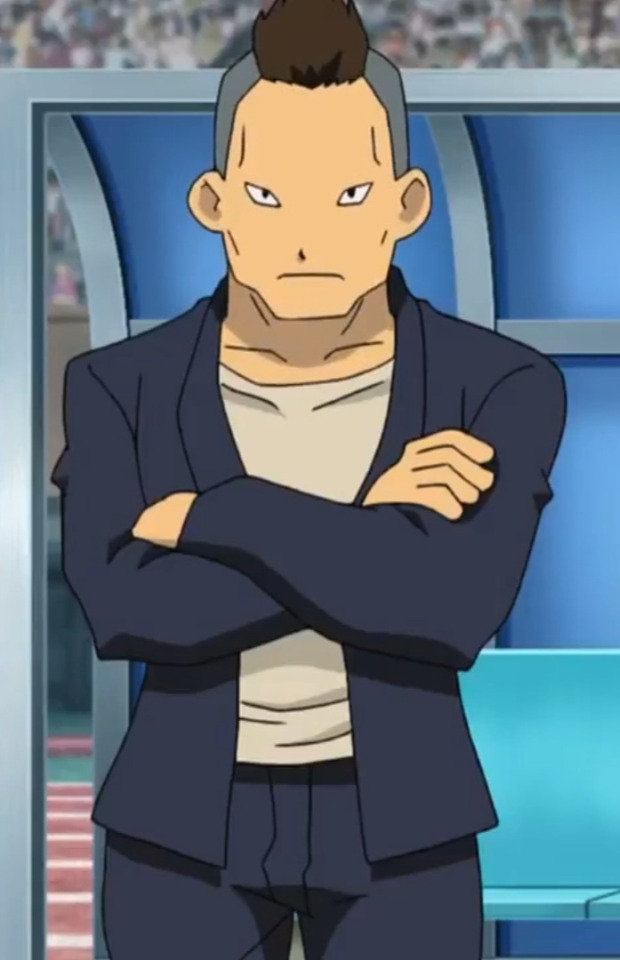
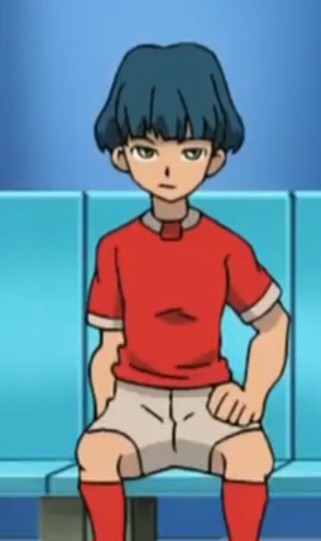
These do not look that similar unlike Majidi and Rajab, so maybe it's a coincidence this time around?
...In my case, NAH. They are uncle and nephew to me. Though, there are reasons why he was called into the selection, and none of them have to do with any nepotism. There are also reasons why they look so different, too (?)
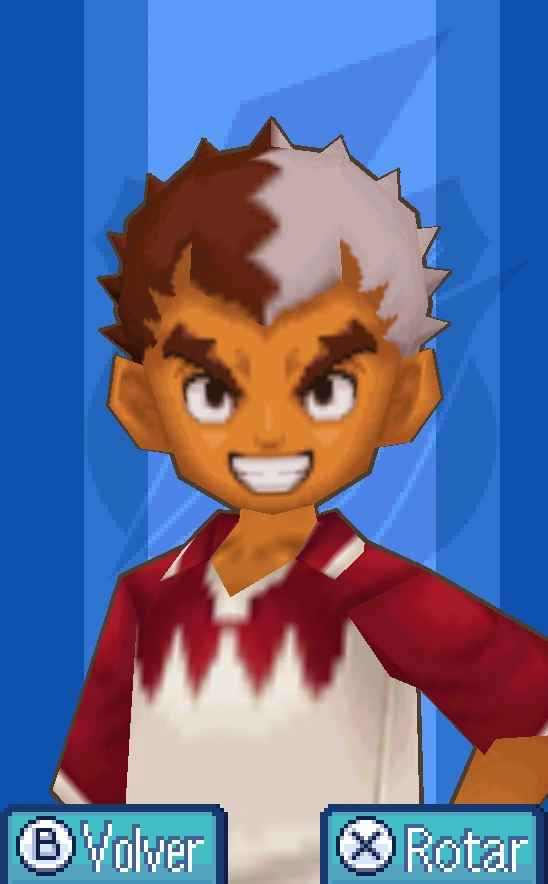
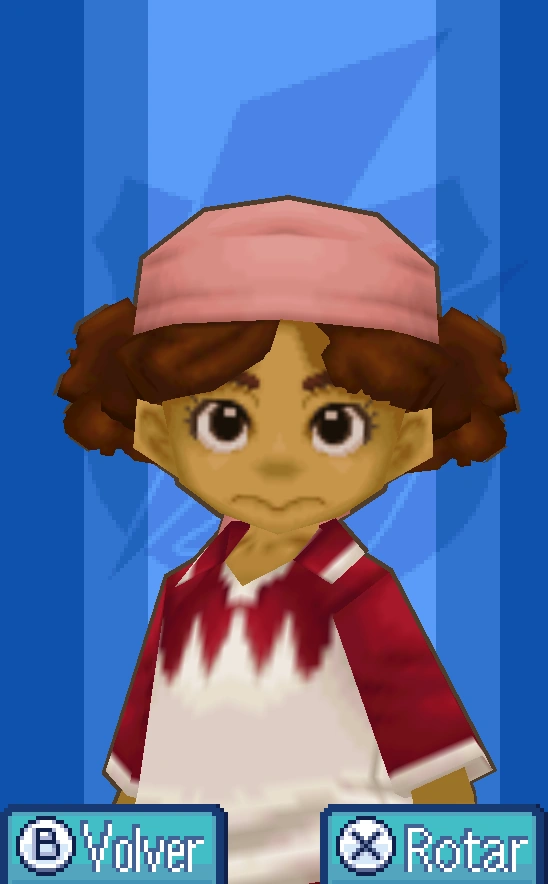
No offense, but there's no way L5 put two players in DL with the same exact surname (Ismail), yet did nothing with the concept or let it be treated as a "coincidence"... 😭
Majidi and Rajab are brothers to me idgaf
---
(And yes, one could argue that their designs aren't that similar, specially on the eye shape, but... Believe it or not, the anime coincidentally did make Majidi's eye design be closer to Rajab's....)
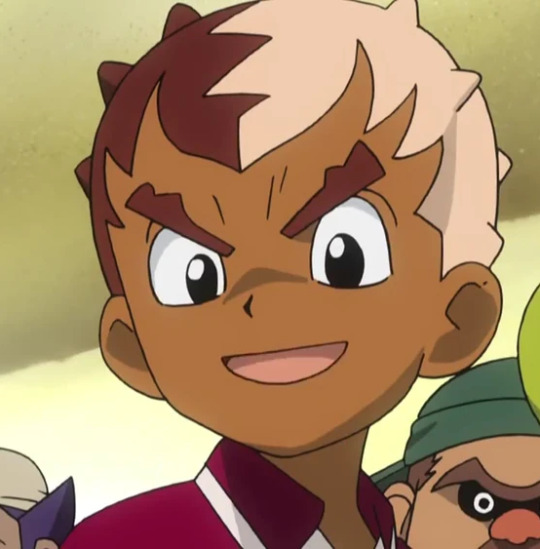
-----
Last Minute Bonus: They do appear together on the bonus DVD BOX poster!!!!! I don't think that's their actual height difference, buuuuut 🥺

#Fire Dragon (Ina11)#Lee Chung-Yoon#Lee Jin-Sung#WAIT HIS NAME CHANGED??? He's not Cheong-Yun anymore....#I need to get used to Chung-Yoon#.......It sounds like a certain forbidden meme I do not want to speak of
7 notes
·
View notes
Text
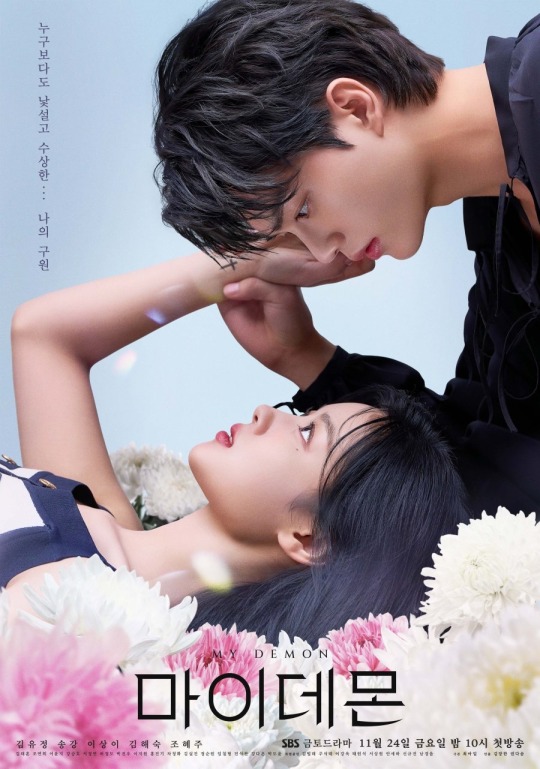
My Demon. 8
Story: 8
Acting: 10
Chemistry: 10
Comparable to: Goblin (kdrama); Tale of the Nine Tailed (kdrama); Doom at Your Service (kdrama)
If you’re familiar to the dramas above then you’ll probably absolutely love this drama. It’s a cheesy romcom fantasy that you switch your brain off. You squee, you giggle, you roll your eyes at the ridiculous dialogue and setups the characters are in/deliver but secretly love it too. I will not stop laughing and squeezing over that kiss garden. Totally ridiculous, totally cute. Oh and yeah chemistry in this, top tier.
#my demon#netflix#kdrama#kim you jung#song kang#lee sang yi#kim tae hoon#kim hae sook#jo hye joo#lee yoon ji#cha chung hwa#romantic comedy#fantasy#supernatural#romantic drama#thriller#fav#rec#❤️
6 notes
·
View notes
Text
My Dearest

This historical drama 21-episodes long is full provoked different feelings in me. It is set in the Qing invasion and we go through all of it with the different characters. Gil Chae is the older daughter of a scholar and she was frivolous, attention-seeking and selfish. I didn't like how she played with the young men in her village, knowing they had a girl waiting for them. She was in love with her friend's fiancé and she tried every way possible to get his attention, but Yeon Joon didn't weaver. It in this "peaceful" time that she meets Lee Jang Hyun, who was passing by the village with his two friends. This young man was not a follower, he wasn't fooled by Gil Chae's flirty ways and he was sort of a player himself. He was a very analytical person, a strategist and a very smart man, which made Yeon Joon and all his fellow scholars look foolish and too naive. Once the invasion starts and the foolish scholars want to join the fight, it is Lee Jang Hyun, who keeps them all alive and that's when he meets the Crown Prince's assistant. Meantime, Gil Chae does the same with the women that were left behind. She makes sure the four of them and a new born child stay alive and return to their village.
This story is not just about Gil Chae and Lee Jang Hyun, but also about the Crown Prince and his wife, and Eun Ae and Yeon Joon. I found it so infuriating that the men expected women to commit suicide if barbarians raped or touched them. It infuriated me how the ones that stayed in Joseon criticized those that were captives and lived years in Qing and then came back home to Joseon. How could they not put themselves in the shoes of those people who suffered so much in a strange land away from home? It infuriated me how the king's concubine lied and manipulated the king to see the Crown Prince as bad. I liked the prince and the princess, they would have been humane rulers because they had lived those experiences together, the king was blinded by his fears to see the truth right in front of his eyes. How could he not understand that his people wanted to back home. They had been taken prisoners and they demonstrated their loyalty by helping the prince and working.
It is a story that takes us through the ups and downs of the relationships between the characters. I like how we can see the gradual change in each character, how their experiences make them mature, while others talk without thinking, hurting people. Specially Yeon Joon with Eun Ae. I liked it. It's a beautiful story with a balance of elements of political intrigue, action, and romance.
Poster from Wikipedia - https://en.wikipedia.org/wiki/My_Dearest#/media/File:My_Dearest.png
#my dearest#korean drama#historical drama#namgoong min#Ahn Eun-Jin#Lee Hak-Joo#Lee Da-In#Kim Yoon-Woo#Park Kang-Sub#Choi Young-Woo#Lee Chung-Ah#Kim Mu-Jun#Jeon Hye-Won
4 notes
·
View notes
Text
Ballerina
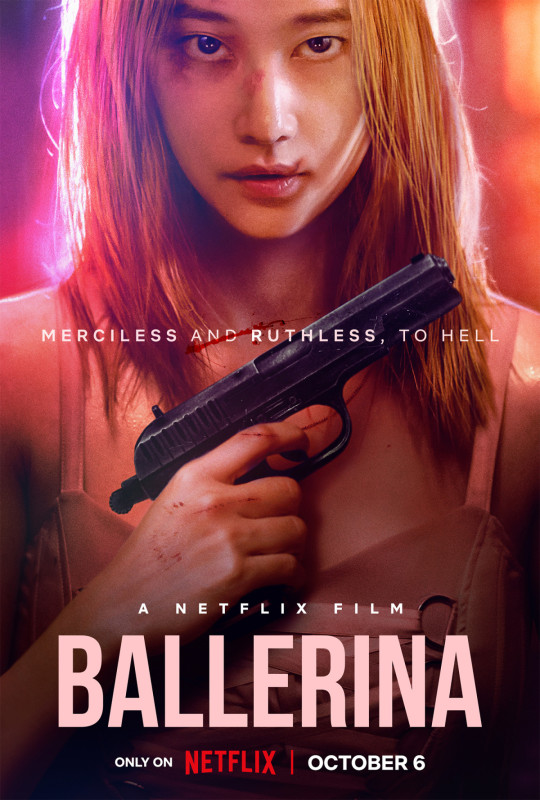
Movies watched in 2023
Ballerina (2023, South Korea)
Director & Writer: Lee Chung Hyun
Mini-review:
I'm a huge fan of Jeon Jong Seo and I enjoyed The Call very much, so I was really looking forward to Ballerina, her second collaboration with director Lee Chung Hyun. Thankfully, it didn't disappoint. It's sleek and visually stunning, and Jeon Jong Seo more than rises up to the challenge. She definitely has what it takes to be an action movie star. Tbh, the script and the story are much weaker and unoriginal than in The Call, but Lee Chung Hyun clearly knows how to direct the hell out of an action scene. Also, the movie is pretty short, so it goes straight to the point and it never gets boring. Anyway, I hope these two keep collaborating, cause so far they've been on fire together.
P.S. There's quite a lot of triggering content, and I recommend looking up some warnings before watching.
#ballerina#ballerina 2023#ballerina netflix#ballerina movie#lee chung hyun#jeon jong seo#kim ji hoon#park yu rim#shin se hwi#kim mu yeol#kim moo yeol#jang yoon ju#kim young ok#joo hyun#action#action movie#thriller#korean movie#south korea#movies watched in 2023
117 notes
·
View notes